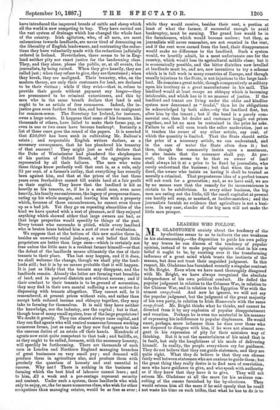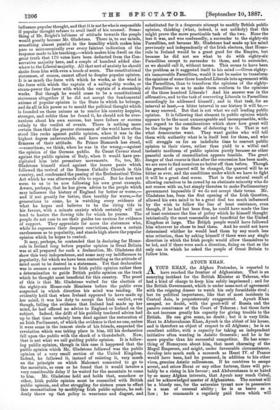LEADERS WHO FOLLOW.
MR. GLADSTONE'S anxiety about the tendency of the by-elections seems to us to indicate the one weakness in his statesmanship,—the disposition to guide his own policy by any traces he can discern of the tendency of popular opinion, instead of to make popular opinion what in his own
belief it ought to be, by exerting over it the transforming influence of a great mind which trusts the instincts of the masses, but does not trust their unguided judgment. In this respect, Mr. Gladstone has furnished recently a singular contrast to Mr. Bright. Even when we have most thoroughly disagreed with Mr. Bright, we have always recognised the absolute independence of his own political conduct. He defied the popular judgment in relation to the Crimean War, in relation to the Chinese War, and in relation to the Egyptian War with the
utmost sang-froid. And now he ignores, we will not say the popular judgment, but the judgment of the great majority
of his own party, in relation to Irish Home-rule with the same
sang-froid. Mr. Bright thinks what he thinks, and cannot be diverted from it by any explosion of popular disappointment
and vexation. Perhaps he is even too masterful in his manner of expressing his indifference to popular displeasure. He would exert, perhaps, more influence than he does over those who are disposed to disagree with him, if he were not almost arro- gant in his expression of pity for their mistaken way of thinking. But it is not the masterfulness of his mind that is in fault, but only the haughtiness of his mode of delivering himself. In reality, the people everywhere cry for guidance. They do not believe that they can guide statesmen, and they are quite right. What they do believe is that they can choose fairly well between statesmen who are anxious to guide them; but the great thing they really desire is to find men of conviction, men who have guidance to give, and who speak with authority as if they knew that they have it to give. They will not esteem Mr. Gladstone at all the more for his anxious con- sulting of the omens furnished by the by-elections. They would esteem him all the more if he said openly that he could not waste his time on such trifles, that what he has to do is to
influence popular thought, and that it is not he who is responsible if popular thought refuses to avail itself of his counsel. Some- thing of Mr. Bright's loftiness of attitude towards the people would greatly become Mr. Gladstone. There is, to our minds, something almost painful in the humility which makes him pore so microscopically over every faintest indication of the response made to his teaching,—which makes him dwell on the great truth that 179 votes have been deducted from the Con- servative majority here, and a couple of hundred added else- where to the Liberal majority. All that sort of anxiety he should shake from him with even a tomb of scorn. The constitutional statesman, of course, cannot afford to despise popular opinion. It is as much the force with which he works, as the wind is the force with which the captain of a sailing-ship works, or steam-power the force with which the captain of a steamship works. But though he would cease to be a constitutional statesman altogether if he did not accept the fundamental axioms of popular opinion in the State to which he belongs, and do all in his power so to mould the political thought which is founded on those axioms as to render his country happier, stronger, and nobler than he found it, he should not be over- anxious about his own success, but leave failure or success calmly to the verdict of events. There is nothing more certain than that the greater statesmen of the world have often stood like rocks against public opinion, when it was in the highest degree unfavourable, and have controlled it by the firmness of their attitude. So Prince Bismarck has stood, —sometimes, we think, when he was in the wrong,—against the opinion of the German public. So Count Cavour stood against the public opinion of Italy, when it would have pre- cipitated him into premature movements. So, too, Mr. Gladstone himself stood against the insane panic which followed the revival of the Roman Catholic Church in this country, and condemned the passing of the Ecclesiastical Titles Act which he was afterwards able to repeal. But he does not seem to us to be now following his own great example. Aware, perhaps, that he has given advice to the people which may influence the history of England for better or worse,— and if not greatly for better, then terribly for worse,—for generations to come, he is watching every evidence of what he hopes and believes to be the rising tide in his favour, with a minute anxiety which certainly will not tend to hasten the flowing tide for which he yearns. The people do not care to see their guides too anxious for evidence of support. They appreciate far more the statesman who, while he expresses their deepest convictions, shows a certain carelessness as to popularity, and stands high above the popular opinion which he hopes to control.
It may, perhaps, be contended that in declaring for Home- rule in Ireland long before popular opinion in Great Britain was at all prepared for such a declaration, Mr. Gladstone did show this very independence, and some may say indifference to popularity, for which we have been contending as the attitude of mind most to be desired in a statesman. Yet that declaration was in essence a surrender to Irish public opinion rather than a determination to guide British public opinion on the track which he thought most beneficial for this country. The proof of this is that Mr. Gladstone waited for the election of the eighty-six Home-rule Members before the public even suspected in which direction his mind was tending. He evidently held that when Ireland appeared to have made up her mind, it was his duty to accept the Irish verdict, even though, failing the evidence that Ireland had made up her mind, he had offered no advice to England or Ireland on the subject. Indeed, the drift of his publicly tendered advice had up to that time certainly been dead against the restoration of an Irish Parliament, of which the evidence is that no one, unless it were some in the inmost circle of his friends, suspected the revolution which was taking place in him, till his declaration fell upon the public with the shock of a thunderbolt. Now, that is not what we call guiding public opinion. It is follow- ing public opinion, though in this case it happened that the public opinion which Mr. Gladstone followed was the public opinion of a very small section of the United Kingdom. Indeed, he followed it, instead of resisting it, very much on the principle on which Mahomet consented to go to the mountain, so soon as he found that it would involve a very considerable delay if he waited for the mountain to come to him. Mr. Gladstone held and holds that, somehow or other, Irish public opinion must be reconciled with British public opinion, and after struggling for sixteen years to effect this reconciliation by modifying Irish public opinion, he sud- denly threw up that policy in weariness and disgust, and
substituted for it a desperate attempt to modify British public opinion, thinking (what, indeed, is not unlikely) that this might prove the more practicable task of the two. None the less it was, and was confessedly, a surrender to the eighty-six Parnellites, not because Mr. Gladstone had made up his mind previously and independently of the Irish electors, that Home- rule in Ireland would be a great good for the Empire, but because he did not see what to do with eighty-six Pamellites except to surrender to them, and to surrender, as we should call it, without terms. This seems to have been the problem as it suggested itself to his mind :—Given eighty- six immoveable Parnellites, would it not be easier to transform the opinions of some three hundred Liberals into agreement with the Parnellites, than to transform the opinions of the eighty- six Parnellites so as to make them conform to the opinions of the three hundred Liberals ? And his answer was in the affirmative, and to the task of converting Liberals to Parnellism accordingly he addressed himself ; and in that task, for an interval at least,—a bitter interval in our history it will be,— he may succeed. But that is not what we call leading public opinion. It is following that element in public opinion which appears to be the most unmanageable and incompressible, with- out regard to the considerations which show how great will be the danger to the State of deferring to it. That is not what democracies want. They want guides who will tell them with authority what is in itself best for them, and who will struggle on for an indefinite time to convert public opinion to their views, rather than yield to a wilful and inelastic modicum of public opinion purely because no other peaceful mode of reconciliation appears feasible. The great danger of that course is that after the concession has been made, we are sure to find ourselves no better off than before. Though the ground of quarrel will be changed, the quarrel will be as bitter as ever, and the conditions under which we have to fight it will be a great deal worse. That is the natural result of allowing ourselves to be cowed by an obstinate minority who do not reason with us, but simply threaten to make Parliamentary government impossible if we do not accept their terms. Mr. Gladstone has, from the first opening of the Irish Question, allowed his own mind to be a great deal too much influenced by the wish to follow the line of least resistance, even though, if he had but been firm, he could have made the line of least resistance the line of policy which he himself thought intrinsically the moat reasonable and beneficial for the United Kingdom at large. The British people would have followed him wherever he chose to lead them. And he could not have determined whither he would lead them by any much less wise criterion, than by asking himself if there were any single direction in which the Irish people would allow thernielves to be led, and if there were such a direction, fixing on that as the only one in which he asked the people of Great Britain to follow him.



































 Previous page
Previous page